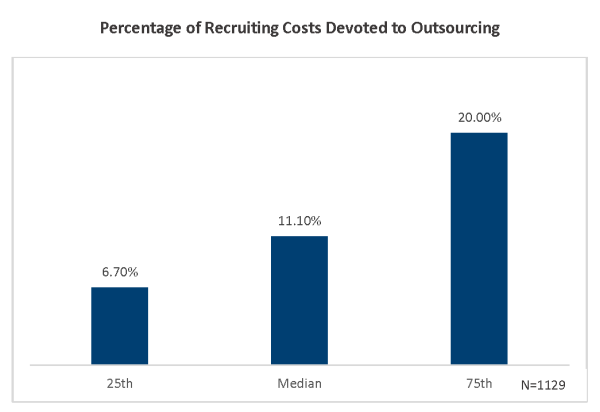
Whether you are looking to ramp up hiring volume fast, explore new talent pipelines, or reduce the administrative burden on your in-house recruiters, outsourcing can make your recruiting process cheaper, faster, and more effective. Many organizations outsource the entire recruiting process, but external service providers can also be tapped to handle specific parts of the process like:
- recruiting strategy,
- job descriptions,
- talent sourcing,
- candidate screening and assessment,
- interview scheduling and candidate communications,
- talent selection decisions, and
- offer letter generation.
In this blog, I will review cross-industry data on the percentage of recruiting costs that go toward outsourcing. Then we will explore the benefits and challenges of outsourced recruiting and I will share three leading practices that help make it more effective.
Benchmarks and Considerations for Outsourcing Recruiting
Through its Open Standards Benchmarking® database, APQC finds that organizations at the 25th percentile spend 6.7 percent of the total cost of the recruiting process on outsourcing. Organizations at the 75th percentile, by contrast, spend 20 percent of the total cost of recruiting on outsourcing.
It is important to note that organizations at the 75th percentile aren’t necessarily doing anything wrong by spending a higher percentage of the total cost of the process on outsourcing. There are many reasons why some organizations might outsource more of the recruiting process than others.
For example, an organization might spend more on outsourcing because it is recruiting within a completely new talent pool and relying on an external recruiting provider for help. That same organization could see outsourced spending drop over time if it invests in developing internal expertise on that talent pool.
An organization’s industry and size can also play a role in the amount of spending that goes toward outsourcing. For example, organizations within the same industry often compete for the same talent pool and experience many of the same upswings and downswings as their industry peers. Organizations with large workforces may outsource more of the recruiting process simply in virtue of the volume of employees they need to hire. Considerations like these make it important to benchmark this measure alongside your industry peers and against organizations of a similar size.
Is Outsourcing Recruiting Right For You?
Outsourcing the recruiting process can benefit an organization in numerous ways, but doing so also carries risks and challenges. Thinking through the pros and cons of outsourcing can help you make a more informed decision about whether to outsource—and to what extent.
Pros of Outsourcing Recruiting
- External recruiters may have the networks, relationships, and expertise needed to fill roles more quickly and efficiently than in-house recruiting.
- Outsourcing allows you to scale up and back down quickly as needed. For example, if your hiring follows seasonal patterns, you can work with an external recruiter for short bursts rather than hiring full-time recruiters in-house.
- External recruiters can provide you access to the latest recruiting technology. Even if you don’t have the resources to implement AI, recruiting analytics, or on-demand interviewing platforms, an external recruiting provider can still provide these for your organization and candidates.
- As part of the nature of their work, third-party recruiters keep up with constantly changing laws and regulations. This expertise is especially valuable if you plan to hire across different locales and regions.
- External recruiters can help you boost diversity, equity, and inclusion (DEI) by helping with inclusive job descriptions, sourcing for diverse talent pipelines, and more.
Cons of Outsourcing Recruiting
- Outsourcing can be expensive and add to your overall recruiting costs if you don’t use it effectively.
- Third-party recruiters may lack organization- or function-specific knowledge, especially if the roles you need to hire are specialized and unique.
- Outsourcing won’t allow you to develop your own talent pipelines and recruiting expertise.
- If you don’t own the recruiting data used by an outsourcer, you may lose access to it when you stop working with them.
Broadly speaking, the benefits of outsourcing the recruiting process outweigh the risks for many organizations, in many situations.
Outsourcing cannot fix a broken process. If there are parts of your recruiting process that are still carried out in-house, work to continually improve and optimize these parts of the process. Even the fastest and most efficient outsourcers won’t help if your process is getting dragged down by lengthy requisition approvals or hiring managers that take too long to make hiring decisions.
Outsourcing your recruiting process can help you save time and money, cultivate new talent pipelines, process high volumes of applications, and more. However, outsourcing is not a “plug-and-play” endeavor. The best organizations know that outsourcing works best when the recruiting process is optimized, leaders have a plan for future workforce needs, and internal teams know the role they will play alongside third-party recruiters. When these foundational elements are in place, the benefits of outsourcing come faster and more easily.
Download the Infographic on The Outsourced Costs of Recruiting.
